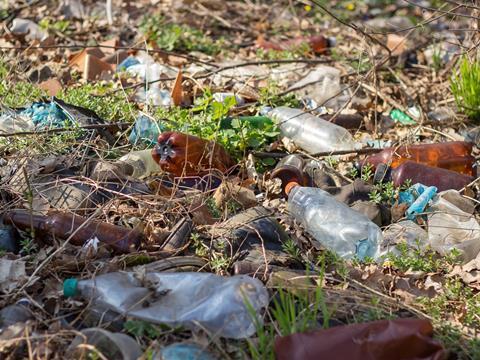
At its annual meeting earlier this month, the World Economic Forum emphasized its view that voluntary initiatives are not enough to substantially reduce plastic pollution, instead backing the development of a global Plastics Treaty and encouraging businesses to unite in favour of the cause.
According to OECD, plastic production and waste more than doubled between 2000 and 2019, yet only 9% of plastic is ever recycled. Furthermore, it is predicted that plastic waste will almost triple by 2060, with around half ending up in landfill and less than a fifth being recycled.
Greenhouse gas emissions from plastics could also rise by 63% by 2040, which would go against the targets of the Paris Climate Agreement.
With packaging said to represent around one-third of plastics use across the world, the Forum has entered initiatives such as the Ellen MacArthur Foundation and United Nations Environment Programme Global Commitment. Its business signatories have apparently outperformed other industry players in cutting down on plastic waste – yet only 20% of the industry is currently participating, reducing the scale of its impact.
However, the World Economic Forum argues that voluntary action is not enough to overcome plastic pollution and actually diminishes competitiveness, thus distorting the market. Instead, the organization advocates for ‘ambitious, coordinated policy measures across the full plastic life cycle’; this includes further intervention in all areas of a plastic’s life cycle, not just downstream waste management – and, crucially, stronger and harmonized regulations.
To avoid a patchwork of nation-specific rules, the Forum pushes for a legally binding treaty that would create a level playing field for the global economy. It highlights the foundation of a Business Coalition for a Global Plastic Treaty, which is intended to reassure Member State negotiators that businesses and financial institutions support the creation of pollution-reducing legislation.
The legal framework should be clear and consistent about the actions companies must take, says the Forum – allowing for short-term focus and long-term investment, with everyone held to the same standards in their pursuit of reduced plastics. It encourages business and organizations with similar views to join the Business Coalition in a bid to send a stronger message in favour of new rules.
Following the last round of treaty negotiations for a Global Plastics Treaty, the World Economic Forum expressed its disappointment that a series of alternative text proposals that limited the treaty’s focus to downstream waste management measures rather than addressing the whole plastics life cycle. It also failed to reach an agreement on intersessional work, which is feared to stall the negotiating process.
The organization recommends that Member States carry out informal consultations prior to the next round of negotiations at INC-4 in April.
The Ellen MacArthur Foundation spoke out about its own opinions on the Global Plastics Treaty in the aftermath of INC-2 in Paris. It also called for legally binding rules and recommended that policymakers factor in the reduction, redesign, and reuse of plastic materials when drafting legislation.
After INC-3 in Nairobi, Packaging Europe spoke to Willemijn Peeters, CEO and founder of circular plastics agency Searious Business, about her views on the negotiations. She felt that some participants were creating deliberate delays around important decisions and raised similar concerns around disagreement surrounding intersessional work.
Also at the World Economic Forum’s annual meeting, Hydro joined the First Movers Coalition’s “green” supplier database for the decarbonization of heavy-emitting sectors, and the First Suppliers Hub – a tool designed to help companies action their climate commitments – was launched.
If you liked this article, you might also enjoy:
The Lidl approach to packaging sustainability
How did Brazil achieve its 100% aluminium can recycling rate – and can it be replicated in the EU?
Experts have their say on the EU’s Packaging and Packaging Waste Directive revisions
A deep dive into the most important packaging sustainability trends and solutions














No comments yet